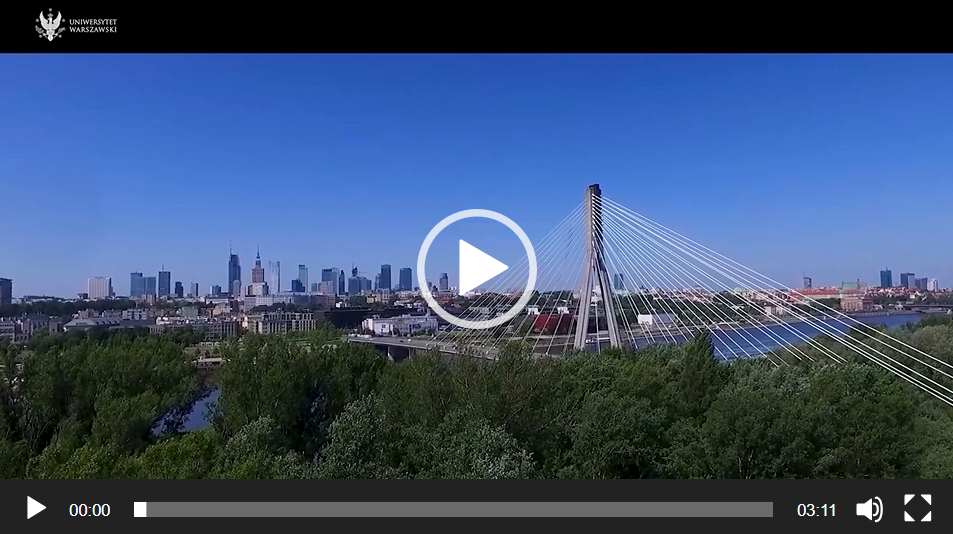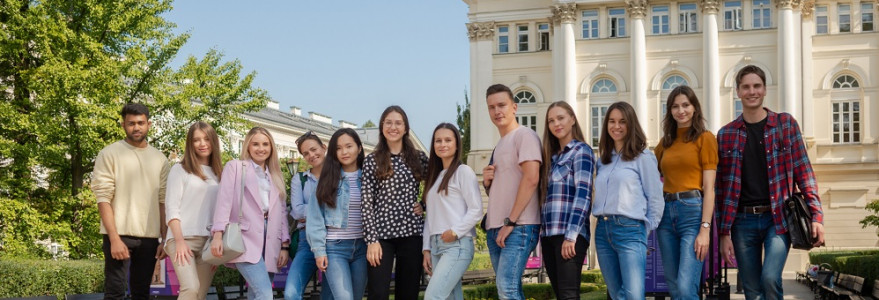More than 270 programmes await future students of the University of Warsaw. Admissions for first-cycle, full-cycle and selected second-cycle degree programmes in the 2025/2026 academic year began on 5th June and will continue until 9th July. The results will be announced on 22nd July.
More than 40,000 students, around 8,000 employees, three campuses, 25 faculties and more than 30 other units make the University of Warsaw the largest university in Poland. Candidates can choose from a wide range of fields: humanities, social sciences, exact and natural sciences, arts, engineering and technology, as well as medicine. UW also offers individual interdisciplinary studies and English-language majors, such as archaeology, astronomy, biotechnology, nuclear chemistry and radiopharmaceuticals, economics, philologies, Swiss studies, criminology, nanoengineering or management. In these admissions, the University of Warsaw will also be recruiting the third year of medical students.
The full offer of studies at the UW in the 2025/2026 academic year is available on the Internet Recruitment of Candidates (IRK) website.
Why UW? Watch the video:

Admissions schedule
- 5th June: start of registration in IRK system;
- 9th July: last day of registration in IRK system;
- 22nd July: announcement of results;
- 23rd–25th July: acceptance of documents from persons qualified for studies.
Full admissions schedule (PL) >>
Information on required documents >>
Admissions schedule for degree programmes with an extended registration deadline, including part-time studies in English and part-time first-cycle and full-cycle programmes, for which the above schedule does not apply, as well as for second-cycle programmes, are set out in the UW Rector’s Order No. 169 of 30th December 2024 (PL). Registration deadlines are available next to each field of study in the IRK system (under the “OFFER” and “REGISTRATION” tabs).
The results of the matura examinations are taken into account in the admission process for first-cycle and full-cycle programmes. Additional entrance examinations are organised for some fields of study.
Admissions statistics (number of candidates per place, point thresholds in previous years) can be found on the website of the UW’s Admissions Office (PL) >>
In last year’s admissions, the highest number of candidates per place applied for:
- medicine (24.6);
- Oriental Studies – Japanese Studies (22.8);
- Business and Management (19.2).
The programmes with the highest score thresholds in the first round included:
- Computer Science (91.14);
- Oriental Studies – Japanese Studies (86.76);
- Oriental Studies – Sinology (86.1);
- Oriental Studies – Korean Studies (85.82);
- Nuclear Energy (83.75);
- English Studies – Linguistics, English Studies – Literature and Culture (83.59).
New degree programmes
- Digital Business, full-time, second-cycle (studies in English)
The studies will cover issues such as digital business and effective implementation of digital technologies in organisations on international markets.
- Global Management, full-time, second-cycle (studies in English)
Students of the programme will learn advanced strategic management, intercultural communication, corporate finance and international marketing.
- International Finance, full-time, second-cycle (studies in English)
Graduates will be familiar with the methods, procedures and practices of effective financial management in an organisation operating in international markets, complex technological, social, political, legal, economic and ecological processes and phenomena. Students will also analyse the fundamental dilemmas of modern civilisation and their impact on the functioning of organisations and the economy as a whole.
- criminology, full-time, first-cycle
This is an interdisciplinary programme that deals with theoretical and practical issues of crime and deviant phenomena, including the origins of criminal behaviour, types and dimensions of crime, profiles of perpetrators and victims, as well as social and legal responses to crime.
- gender and sexuality, full-time, second-cycle
Students will learn about contemporary theories of identity as well as the historical and institutional conditions of cultural representations and practices related to gender and sexuality.
- artificial intelligence and cognitive science, part-time, first-cycle
This interdisciplinary programme combines knowledge of artificial intelligence (AI) with the study of human cognitive processes and brain functioning. Students will gain knowledge of reasoning, language, learning and decision-making, while developing critical thinking skills and an understanding of both the mechanisms of human cognition and the operation of AI systems.
ZIP 2.0 courses
Six additional courses will also be launched as part of the Integrated Didactic Development Programme – ZIP 2.0. These programmes are adjusted to the changing expectations and competences of students, as well as to the needs of the developing economy and the green and digital transformation. The programmes include:
- Nature Conservation, full-time, first-cycle – this degree combines natural sciences and law, giving students the tools for real-world protection of the biosphere;
- Animal Protection, full-time, second-cycle – it is a nationally unique combination of law, social sciences, humanities and biological sciences that comprehensively prepares students to work in the field of legal protection and animal welfare. The course is distinguished by its interdisciplinary approach, combining legal knowledge with psychology, biology and cultural studies to provide a comprehensive understanding of human-animal relations in legal, ethical and environmental contexts;
- Biological Therapeutics, full-time, second-cycle (studies in English) – it is the only second-cycle degree programme in Poland conducted in English, which combines science with the pharmaceutical industry. Its programme was developed in cooperation with a leading research institution – the International Institute of Molecular and Cell Biology in Warsaw. The studies will provide in-depth knowledge and practical experience in the design and research of modern biological drugs that are revolutionising modern medicine;
- Textual practices laboratory, full-time, first-cycle – programme for those who wish to use literary and linguistic knowledge to change the broader socio-economic environment. Combining philological methods with new tools, students will learn text analysis, communication in the digital world and content design for culture, media and education;
- Digital Marketing, full-time, second-cycle – the studies prepare students to work in a dynamic environment, teaching web analytics, marketing strategies, social media and tools based on artificial intelligence;
- Business analytics, full-time, second-cycle – programme for those who want to turn data into real business decisions. The studies combine statistics, programming and modern analytical tools, preparing students for a dynamic job market.
Laureates and finalists of olympiads and national thematic competitions
The rules for the admission of laureates and finalists of central-level olympiads as well as laureates and finalists of international and national competitions in the 2025/2026 academic year are set out in Resolution No. 63 of the UW Senate of 16th June 2021 on the rules for the admission of laureates and finalists of central-level olympiads and laureates and finalists of national and international thematic competitions in the academic year 2025/2026, together with an annex (PL) >>
Eligibility resulting from the title of laureate or finalist in the admissions to first- or full-cycle studies at the UW in the 2025/2026 academic year is granted to persons who hold a certificate of laureate or finalist of a central-level olympiad, issued no earlier than in the 2021/2022 school year.
Detailed information on the admissions of laureates and finalists of olympiads as well as laureates of thematic competitions to study at the UW can be found on the website of the UW’s Admissions Office and in the IRK system.
Among the olympiads organised by the University of Warsaw in the 2024/2025 academic year were:
- Belarusian Language Olympiad (Faculty of Applied Linguistics);
- Security and Defence Knowledge Olympiad (Faculty of Political Science and International Studies);
- Media Knowledge Olympiad (Faculty of Journalism, Information and Book Studies);
- Knowledge of Poland and the Contemporary World Olympiad (Faculty of Political Science and International Studies).



